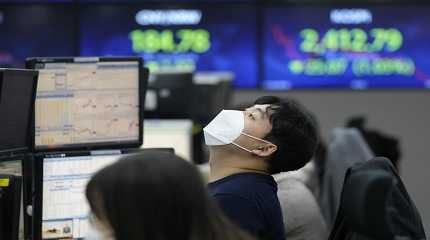
BANGKOK (AP) — Shares slumped in Europe and Asia on Monday, with Hong Kong briefly dipping more than 4% following weekend protests in various cities over China’s strict zero-COVID lockdowns.
U.S. futures were lower and oil prices fell more than $2 a barrel.
The unrest in China is the boldest show of public dissent against the ruling Communist Party in decades. It followed complaints that policies aimed at eradicating the coronavirus by isolating every case might have worsened the death toll in an apartment fire in Urumqi in the northwestern Xinjiang region.
China’s infection rate has been lower than in the United States and other countries. But resentment has been growing over the economic and human costs of the approach known as “zero-COVID,” as businesses close and families are isolated for weeks with limited access to food and medicine.
“For investors, when it comes to China, trying to predict with any degree the reopening certainty that has no certainty, basis, or track record to go by is looking like a dangerous game in the context of the disquieting protests and the colossal challenge China’s leaders now have on their hands,” Stephen Innes of SPI Asset Management said in a commentary.
Rising numbers of COVID cases could further disrupt manufacturing and transport, adding to headaches over supply chains and inflation.
Germany’s DAX fell 0.8% to 14,421.88 while the CAC 40 in Paris lost 0.8% to 6,656.18. Britain’s FTSE 100 gave up 0.6% to 7,448.10.
The future for the S&P 500 was down 0.7% while that for the Dow Jones Industrial Average was 0.5% lower. On Friday, the S&P 500 fell less than 0.1% while the Dow rose 0.5%. The Nasdaq fell 0.5%.
In Asian trading Monday, Hong Kong’s Hang Seng fell 1.6% to 17,297.94 and the Shanghai Composite index lost 0.8% to 3,078.55.
Shares in telecoms equipment maker ZTE fell 4.2% after U.S. regulators banned sales of its products in the U.S.
The Federal Communications Commission said Friday it was banning the sale of communications equipment made by ZTE and Huawei Technologies and restricting the use of some China-made video surveillance systems, citing an “unacceptable risk” to national security.
On Friday, China’s central bank sought to boost the economy by easing its reserve requirement ratio, the proportion of assets banks must hold in reserve, by a quarter percentage point to 7.8%. But pandemic-related developments overshadowed that news.
Tokyo’s Nikkei 225 index shed 0.4% to 28,162.83 and the Kospi in Seoul lost 1.2% to 2,408.27. In Sydney, the S&P/ASX 200 declined 0.4% to 7,229.10 following the release of weaker than expected retail sales data.
Bangkok’s SET was 0.2% lower while the Sensex in Mumbai added 0.3%.
Wall Street gets several big economic updates this week. The Conference Board business group will release its November report on consumer confidence and the U.S. government will release its closely watched monthly employment report.
Investors remain concerned about whether the Federal Reserve can tame the hottest inflation in decades by raising interest rates without going too far and causing a recession.
The central bank’s benchmark rate currently stands at 3.75% to 4%, up from close to zero in March. It has warned it may have to ultimately raise rates to previously unanticipated levels to rein in high prices on everything from food to clothing.
In other trading Monday, U.S. benchmark crude oil lost $2.27 to $74.01 per barrel in electronic trading on the New York Mercantile Exchange. It gave up $1.66 on Friday to $76.28 per barrel.
Brent crude, which is used to price oil for international trading, sank $2.57 to $81.14 per barrel.
The dollar fell to 137.71 Japanese yen from 139.28 yen. The euro rose to $1.0451 from $1.0379.




